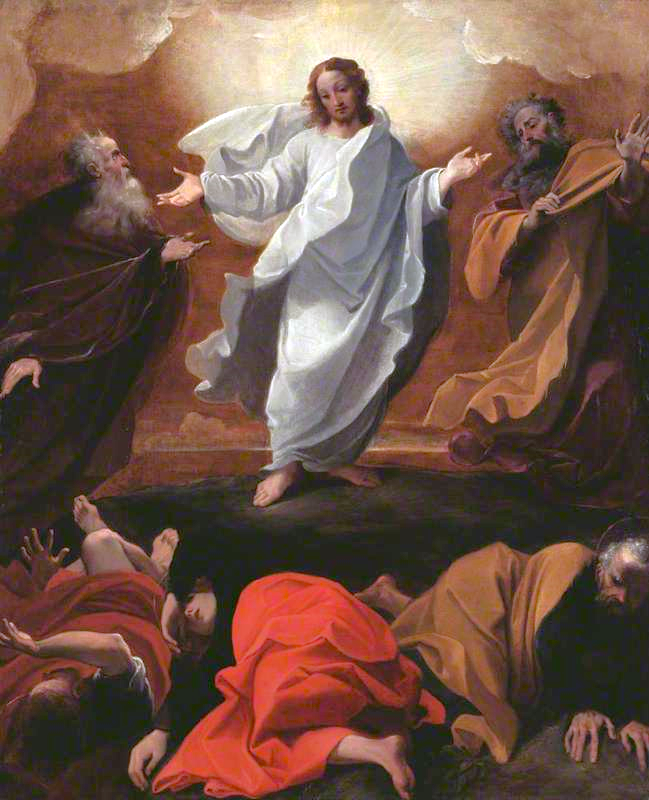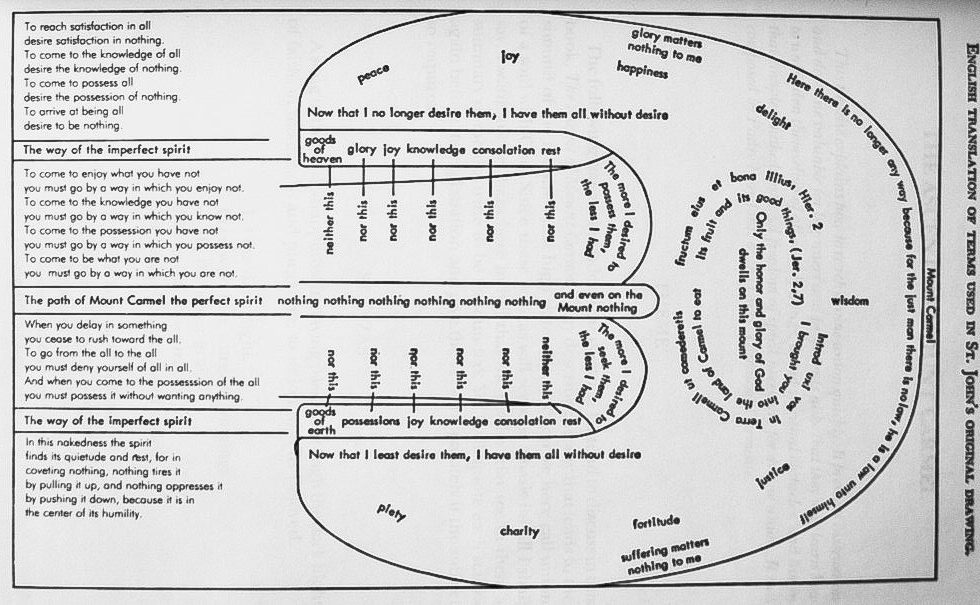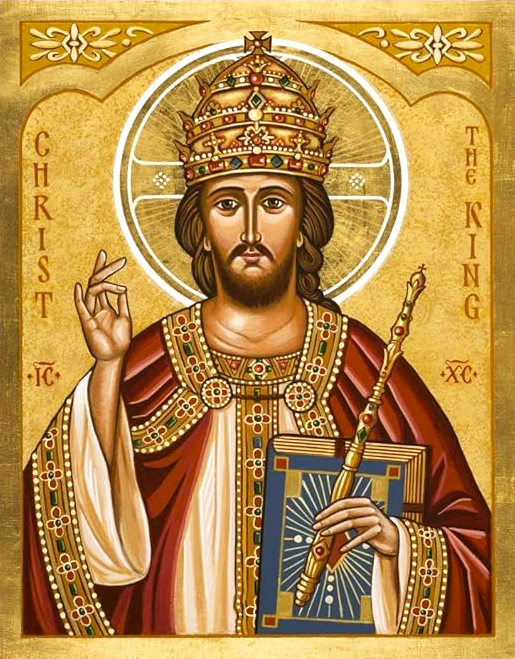Translation of the Epistle for the Second Sunday of Lent
Brethren: Even as you have learned from us how you ought to walk and to please God — as, indeed, you are walking — we beseech and exhort you in the Lord Jesus to make even greater progress. For you know what precepts I have given you by the Lord Jesus. For this is the will of God, your sanctification; that you abstain from immorality; that every one of you learn how to possess his vessel in holiness and honor, not in the passion of lust like the Gentiles who do not know God; that no one over-reach and transgress his brother in the matter, because the Lord is the avenger of all these things, as we have told you before, and have testified. For God has not called you unto uncleanness, but unto holiness, in Christ Jesus, our Lord.
Continuation of the Holy Gospel according to St. Matthew
At that time, Jesus took Peter, James, and his brother John, and led them up a high mountain by themselves, and was transfigured before them. And His face shone as the sun, and His garments became white as snow. And, behold, there appeared to them Moses and Elias, talking together with Him. Then Peter addressed Jesus, saying, “Lord, it is good for us to be here. If Thou wilt, let us set up three tents here, one for Thee, one for Moses, and one for Elias.” As he was still speaking, behold a bright cloud overshadowed them, and behold, a voice out of the cloud said, “This is My beloved Son, in whom I am well pleased; hear Him.” And on hearing it, the disciples fell on their faces and were exceedingly afraid. And Jesus came near, and touched them, and said to them, “Arise, and do not be afraid.” But lifting up their eyes, they saw no one, but Jesus only. And as they were coming down from the mountain, Jesus cautioned them, saying, “Tell the vision to no one, till the Son of Man has risen from the dead.”
The Saving Words of the Gospel.
And Jesus took with Him His disciples.
In the Name of the Father, and of the Son, the Holy Spirit. Amen.
This mystery of the Transfiguration is reported in the three Synoptic Gospels. Also, St. Peter, who is present there, speaks of it in his Second Letter. And it’s placed here in the liturgical year just as it is in the life of our Lord; shortly before His Passion. So, it becomes something of a context for everything that is about to happen, so that this will be then the prism, the lens, through which the Disciples should understand the Passion. So, our Lord is giving them something of a preview of His glorified body so as not to forget that in the time of crisis, in the time of trial.
There’s this interesting verb Jesus took with Him. Παραλαμβανω (paralambano). Παραλαμβανω. And we’ve just seen it, this is in Chapter 17 of Matthew, the same verb is used by Peter after Christ announces the Passion. What is it? Taking one to oneself. We also saw it last Sunday in the Temptations of Christ. Παραλαμβανω. The devil took Christ to himself on the parapet to show him all of these kingdoms. And so, here our Lord is taking them to Himself to reveal something of Himself, whereas when Peter does it, takes Christ to himself, he’s chastised and called Satan. And when Satan does it, our Lord sends him away. So, in a certain sense, it’s something that our Lord is allowed to do with us, but we’re not allowed to do with Him.
We allow Him to take us to Himself because when we want to take Him to ourself, we reduce Him to our own level and we can often think of Christ as simply our resource; the One who gives me stuff. And what is that stuff? Well, it’s whatever anybody wants. The problem here is that we often want to make our Lord… We believe in Him, we love Him, we serve Him, and that’s why we’re here in Mass, and nonetheless, He’s at the top of our list of things that we want. And that’s a skewed vision of Him.
If you’ve ever seen St. John of the Cross’s book, the Ascent of Mount Carmel, he starts with this image of a mountain. There are three paths up the mountain. There’s a middle path that goes straight to the top and it’s littered with this word, “nada, nada, nada, nada,” “nothing, nothing, nothing, nothing,” all the way up at the top. Then on the right side, there’s another path that doesn’t make it all the way and this is earthly goods; love for earthly goods. And it doesn’t make it to the top. On the left, perhaps more enigmatically, are heavenly goods and he enumerates what these heavenly goods are just as he enumerates the earthly goods. It’s joy, knowledge, consolation, rest. He has those in earthly, he has those in heavenly, the exact same terms. But he says, “The more I desire these things, the less I have of them, and none of them make it to the top.” And at the top is God’s honor and glory, that’s all. And he says, “And nothing more.”
So, when Christ calls His Disciples to Himself to reveal Himself to them, we see this metamorphosis, this is the word that’s used, this transfiguration in which the form, the visible form, is changed. Not His interior form. Obviously, He’s still God. He still has His human nature. His divine person is not emptied or altered. Rather, His divine person alters things and, in this case, human nature in the creature Jesus of Nazareth. But He also does that for us as well in which He takes us to Himself to transform us, if we allow Him. But we put many obstacles up the path to Calvary, to Heaven, to God Himself, through wanting something from Him, wanting things. Even if they’re heavenly things, He’s not a thing. He’s not a creature. And so, our desire for things from Him then becomes an obstacle to complete union because we can absolutize those things. And He’s the only absolute.
When our Lord reveals Himself in His glory on the Holy Mountain, He’s speaking with Moses and Elijah, the Law and the Prophets. He’s speaking with them about His Passion. And so, we see the Law and the Prophets, and now the Gospel in the person of Jesus Christ. And this Gospel of the Passion now is going to be fully revealed in the context of glorification.
The problem is we seem to… we can take one aspect and absolutize that aspect at the cost of the other things. And this is the temptation. Temptation the Apostles are going to have with the Passion of Christ. They’re going to absolutize the Passion and thereby lose their hope. Just as the Disciple of Emmaus said, “We had hoped that he was the one who would come to free us.” They absolutize this one thing that our Lord already predicted.
Now John of the Cross when he talks about the path of nothing – he is not a Manichaeist, he is not a Puritan, who thinks that created things are evil or heavenly things, much less, are evil. Rather, he says they’re not absolutes. He says, “The more I desire them, the less I have of them. When my only desire is the glory and honor of God, I then possess those earthly goods but without desire for them. I also possess all of the heavenly goods but without desire for them.” That desire for them is to absolutize them, to make them ends.
Sometimes we can do that to our Lord. We make Him a means towards an end. “Lord, I want you to give me this”, and if He doesn’t give us that, whatever it may be, it might be holy, it might be earthly, we threaten Him with a faith crisis or we get angry at Him for not jumping through our hoops. He’s not a performing flea. He is our Creator, our Redeemer, He’s our Judge, He is all. And to see anything after Him as number two on my list, number three, is not to see Him clearly. So, our Lord is revealing really the full story of Himself in this Gospel.
Peter reveals his own attachment to earthly things when he doesn’t want this moment to pass. “Lord, let us…” He uses the word “here” twice. “Lord, it’s good for us to be here.” He doesn’t say “good,” it says καλων (kalon). It means it’s beautiful for us to be here. “Let us build three tents. So, he doesn’t want the moment to pass, he doesn’t want to leave the holy place. But our Lord… What happens? God the Father interrupts him. He says, “Behold my beloved Son whom I’m well pleased. Hear Him.” Which means to obey Him. In other words, Peter is also remonstrated by the Father for wanting to absolutize this moment in this place.
It’s understandable that he would have that reaction. We’ve all had moments of beautiful consolation perhaps in Adoration You don’t want them to end and nonetheless, consolation is not God. We don’t serve consolation. That’s a creature. So, this is a Gospel about absolutes and the only absolute here is Christ. It’s the Trinity. It’s the Holy Spirit, who’s the cloud from which the voice of the Father comes. That’s the only absolute. It’s not number one on the list. It’s not something in competition with other things. He is everything.
And may He be everything for us.
In the Name of the Father, and of the Son, the Holy Ghost. Amen.



